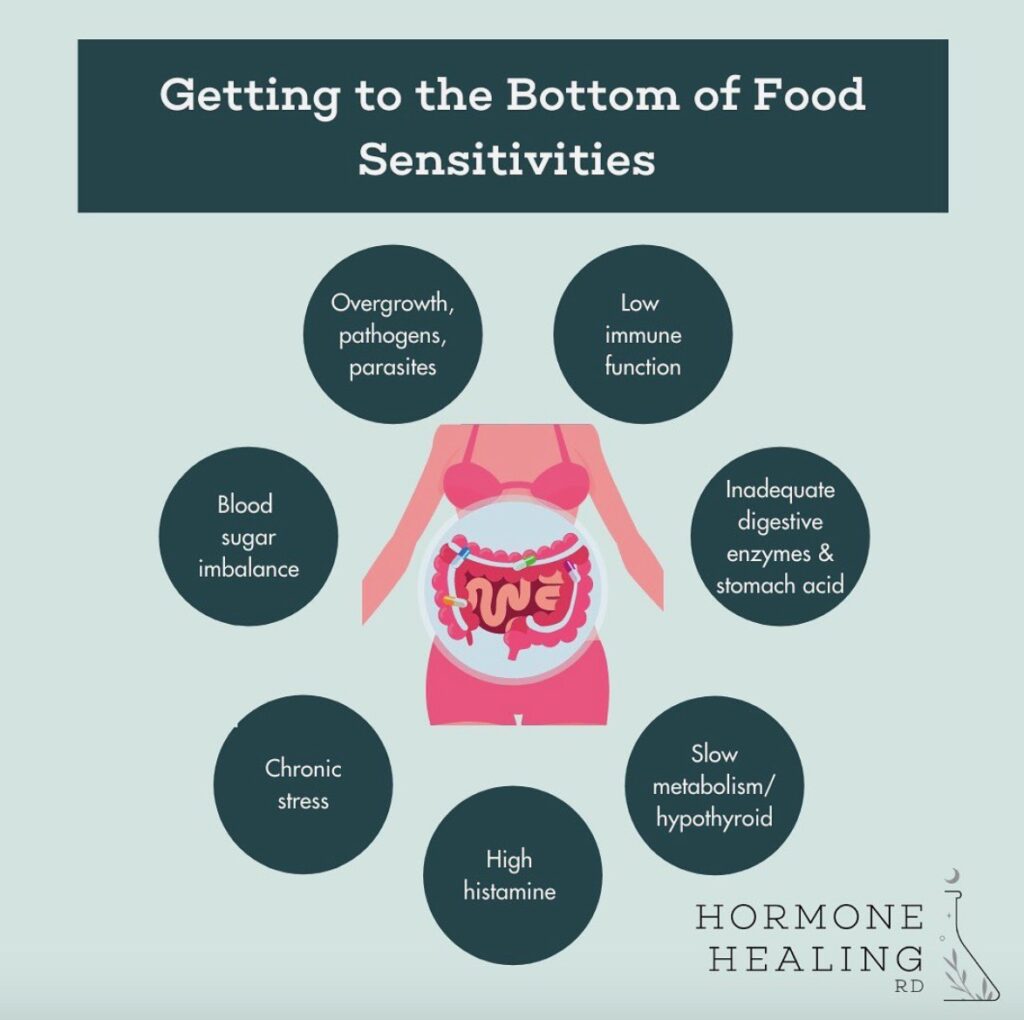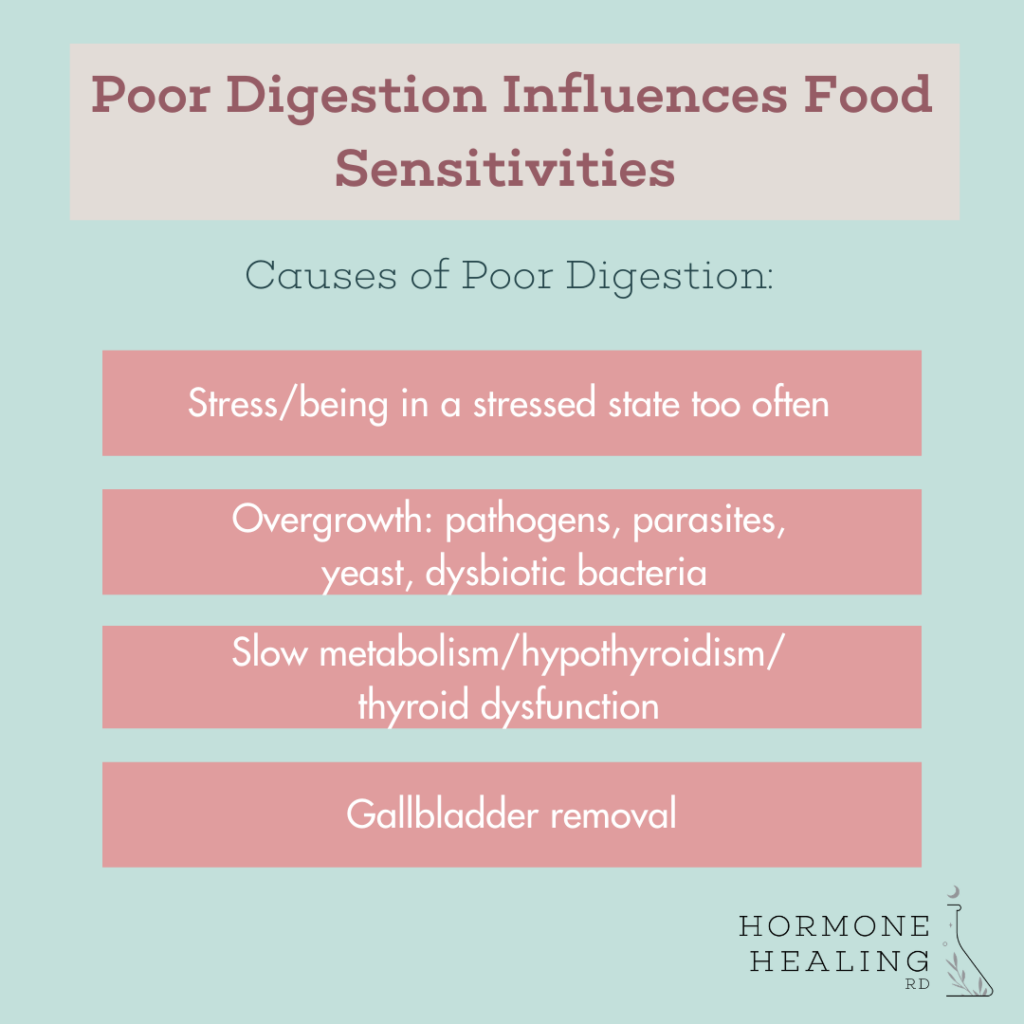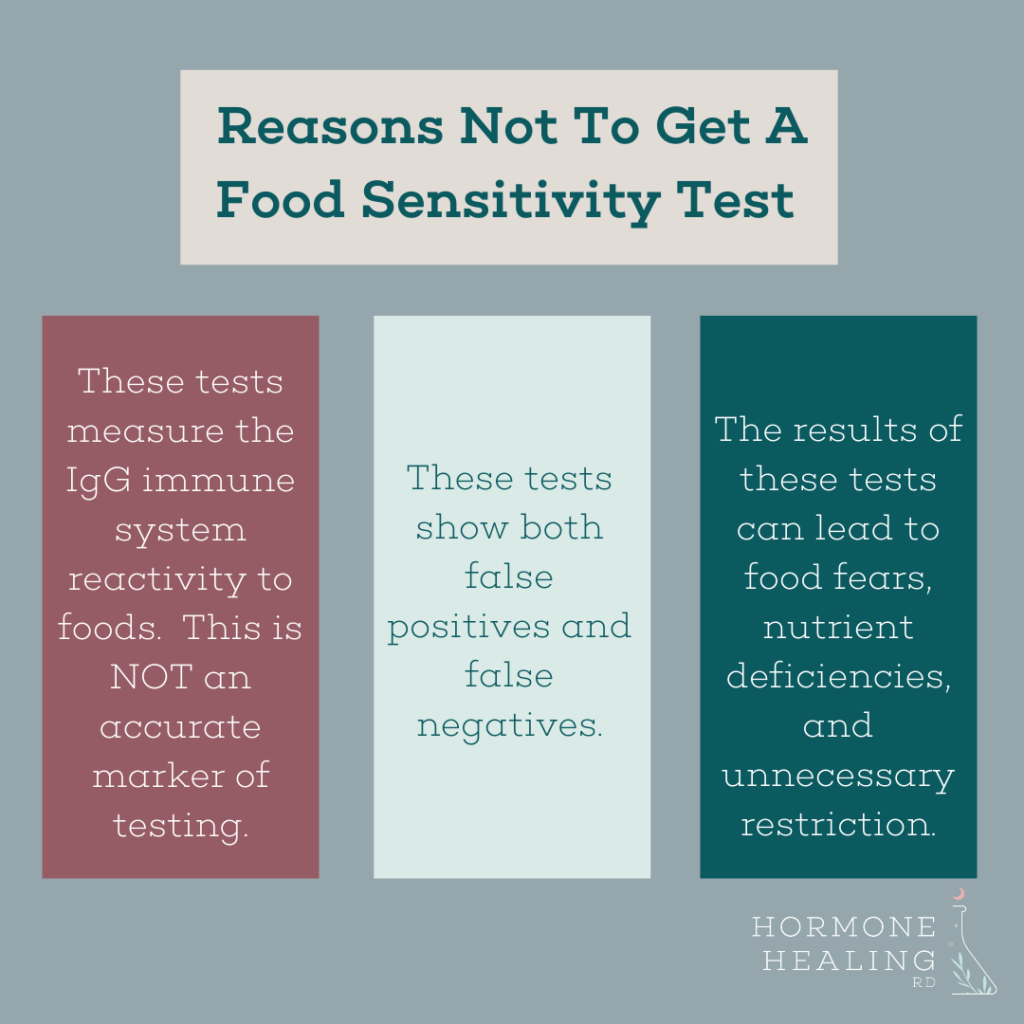Are you struggling with food sensitivities? Do you find that you are all of a sudden reacting to foods you love and eat all the time? I am probably going to surprise you with what I say next. Food sensitivities are a symptom, not your problem. Reacting to food is not normal. It is feedback from your body that something is off. The information is helpful in that it asks you to dig deeper into digestive health and function. There are several different possible reasons for food sensitivities. Keep reading for a more in-depth explanation of the top three reasons for food sensitivities and to find the answers to the commonly asked questions regarding food sensitivities.

What is the difference between a food sensitivity and a food allergy?
There is sometimes confusion around whether a person is sensitive to a food or allergic to it. Food allergies are an immune response to a food that affects multiple organs in the body. Allergies are often severe and can be life-threatening. On the other hand, food sensitivities trigger reactions from the digestive system. Symptoms are usually confined to the digestive tract, with a couple of exceptions, such as headache and irritability. Food sensitivity itself is a symptom, not the main problem. Food sensitivities are not normal. They indicate that there is dysfunction in the gut.
How does poor digestion cause food sensitivity?
The first area I think to look at is digestive capacity. Something to consider is, are you making enough stomach acid and digestive enzymes? Both are important for proper food breakdown and killing parasite and pathogenic bacteria. When we do not make enough stomach acid and digestive enzymes, we do not break down our food properly, leading to large food particles getting into the system, which alerts our immune system. All foods can cause a poor reaction in the gut if we are not breaking it down well. For this reason, some individuals who do a food sensitivity test may find things like beef, avocado, eggs, and coconut on there. Even foods that you eat all the time may all of sudden cause a reaction. This is an indicator that something inside your body has changed. Usually, it is not just one trigger, but rather many things. Here are some of the causes of poor digestion:

How does a slow metabolism cause food sensitivity?
Slow metabolism is another major contributor to food sensitivity. When I say metabolism, I am referring to the cellular function of your body. Slow metabolism impacts how you break down your food and how quickly it moves through your digestive tract, causing constipation. Is your body able to use the energy you eat to generate heat, or are you frequently cold? Maybe you have a diagnosed thyroid issue, or you suspect one. Is your digestion sluggish? Do you tend to have PMS and period problems? Do you struggle with acne (a sign of insufficient detox capacity)? When metabolism is slow, everything else slows down. If food particles are not moving through the digestive tract at the appropriate rate, intestinal overgrowth occurs.
How do overgrowth, pathogens, and parasites cause food sensitivity?
When we have less stomach acid and poor digestion, it allows parasites and pathogens to get through and inhabit our GI tract. Parasites and pathogens live on the foods we eat. They eat our food before our bodies get to digest it. With parasites and pathogens living in our GI tract, it causes the environment of our gut to change. Our good bacteria become outnumbered, and it gets more challenging for them to survive. An overgrowth of harmful bacteria and yeast in the gut leads to digestive dysfunction. More dysfunction means more food reactions.
How can I test for food sensitivities?
There are food sensitivity tests on the market, but I do not recommend them because they are not reliable. Fellow Registered Dietitian Lacey Dunn has a great post on her Instagram, @faithandfit, explaining why food sensitivity tests are not that great and why they are not helpful. I will highlight a few of her main points:

If you do a food sensitivity test and see all the foods you consume regularly, foods you thought were healthy and nourishing to you, should you eliminate them forever? The answer is no. Sensitivities are only a sign from your body that something is off. My recommendation is to get a stool test done. With my clients, I use a GI-map. It is a DNA-based stool test. It is incredibly accurate and great at catching different types of parasites and overgrowth. Also, it looks at if you are making enough digestive enzymes? Are you breaking down fat? How is your immune system? Is it overactive or underactive? You will get a great picture of the health of your digestive system and your immune health. This is an excellent tool if you think you have food sensitivities, or if you have reflux, loose stools, or feel your gut health could be impacting your estrogen levels.
Time to be practical, if all of the foods you eat are marked red on your food sensitivity test, does that mean that you will never eat them again? Do you want to have a strict and limited diet, or do you want to be able to eat the foods you enjoy? This is our digestive system, and our body is giving us a piece of information saying, hey, something is off. Take a more in-depth look and the root of the symptoms. Healing your gut starts with optimizing your metabolism—and this is where my Master Your Minerals Course comes in. In it, we teach you how to interpret your own HTMA, nourish your metabolism, and build a hormone-healing protocol based on your unique results. I have answered some of the most commonly asked questions regarding food sensitivities; you can find them below.
Frequently Asked Questions (FAQs):
1. What’s the best lab test for food sensitivities?
I do not recommend any. I do not think they are helpful. I recommend saving your money and doing a stool test, specifically, a GI-map.
2. What are some symptoms of food sensitivities?
Food sensitivities can be a delayed reaction. They can be tricky. The best thing to do is eliminate that food for a while, then add it back in once. Wait at least three or four days and try to eat it again to see if you can see any changes. Symptoms can be a headache, or migraine, acne, a rash. It could be digestive distress right away, GI discomfort, constipation, or diarrhea.
3. How do you get rid of food sensitivities?
Stool testing and looking at supporting digestion. If a stool test reveals a parasite or pathogen, like H Pylori, you cannot eradicate it. You have to support digestion and liver detoxification. You need to support your immune system because whenever we are eradicating, we ask our immune system to step up and do a lot of work for us. Eliminate the foods you have an apparent reaction to while doing gut healing and slowly reintroduce them.
4. How to reintroduce foods?
It depends on the person and what their gut protocol and health are like. Is the food something they enjoy? Is it something impractical to have to eliminate? Reintroduce the food slowly and give yourself plenty of days between because you want to see a reaction. Sometimes people do not notice a response unless there is a lot of that food; occasionally, people notice it right away with a small amount. It all depends on the severity of food sensitivity.
5. What is a quality probiotic?
I always talk about supporting your gut and immune system. I love MegasporeBiotic, but you usually have to get it through a practitioner. There is another one that I love called Just Thrive. It is also a spore-based probiotics that you can find on Amazon.
6. Are grains harmful to digestive health?
Grains can be totally fine for some people. How you prepare the grains and what you are eating it with can be bothersome. For example, if you are eating wild rice without soaking it first, you probably will not digest it well. Grains contain phytates and phytic acid, which can bind to nutrients in the food and take away the nutritional value. Grains, as well as legumes, are plant foods. Soaking them first will make them easier to digest. If you don’t do well with grains, I suggest eating white rice first. If you are going to do a whole grain, make sure you soak it.
7. What do I do if I have a sensitivity to fermented foods and histamines?
When people react to fermented foods, it is often a histamine reaction. There will be an excessive amount of histamine in the blood. They are not breaking down fermented foods. Many people think of the DAO enzyme, which can impact that, but you have to think about what runs that enzyme. What is the root of the root issue? A lot of times, it is a copper issue. Whole food vitamin C, a food form of copper, and B vitamins like liver or other organ meats and bee pollen can help with reactions to histamine foods. Often when we have a histamine reaction, it is because we have an overgrowth in bacteria in the gut, and that can lead to copper issues and then result in a reaction.
8. What are the protocols for parasites?
Parasites show up on a stool test. I use the GI Map stool test that is DNA based and more accurate than others with my clients. All parasites get treated differently; therefore, identifying the specific type of parasite via a stool test is helpful. Some can be eradicated with oregano oil, some with different herbs, and others with saccharomyces boulardii (a powerful bacteria). After eradication, you will still need to support the digestion and immune system.
9. What is the best way to interpret basal body temperature and pulse in regards to food sensitivity?
I recommend using body temperature and pulse to check the functionality of your metabolism after a meal. This will tell if you are supporting your metabolism. Are you increasing your body temperature, making heat from the foods that you are eating, or is it decreasing metabolism and having the opposite effect. If you are sensitive to a food, you might have a stress response to it (like an increase in cortisol) and see a higher pulse after that meal. How to know if your body temperature increasing is good or not; you want to compare it with your pulse. If your pulse increases and it is high (above 85-90 bpm), then that means it is a stress response and could potentially be from the food you ate. That tells you your temp is high because of stress, not proper metabolism. If your pulse stays between 75 and 85 bpm, and your body temperature increases, your metabolism has been supported.
Finding out you have a food sensitivity can be stressful. However, it does not mean you have to give up the foods you love forever. Food sensitivities are a sign that there is an issue within your body. If you suspect you have a food sensitivity, skip the food sensitivity test and instead take a GI mapping test. The GI map will pinpoint the underlying issue that needs to be corrected. Correcting the problem equals eradicating food sensitivity. For more information like this, sign up for my weekly newsletter, the Feminine Periodical.
